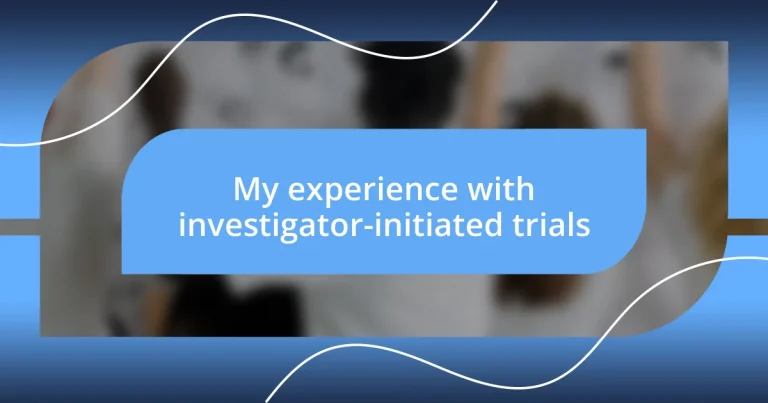Key takeaways:
- Investigator-initiated trials originate from clinical needs, offering high autonomy in design but requiring careful regulatory oversight and funding challenges.
- Participation provides patients access to innovative treatments, rigorous care, and fulfillment of contributing to medical advancements, fostering a sense of empowerment.
- Collaboration and adaptability among research teams enhance trial outcomes, emphasizing the importance of diverse perspectives, communication, and emotional support throughout the process.
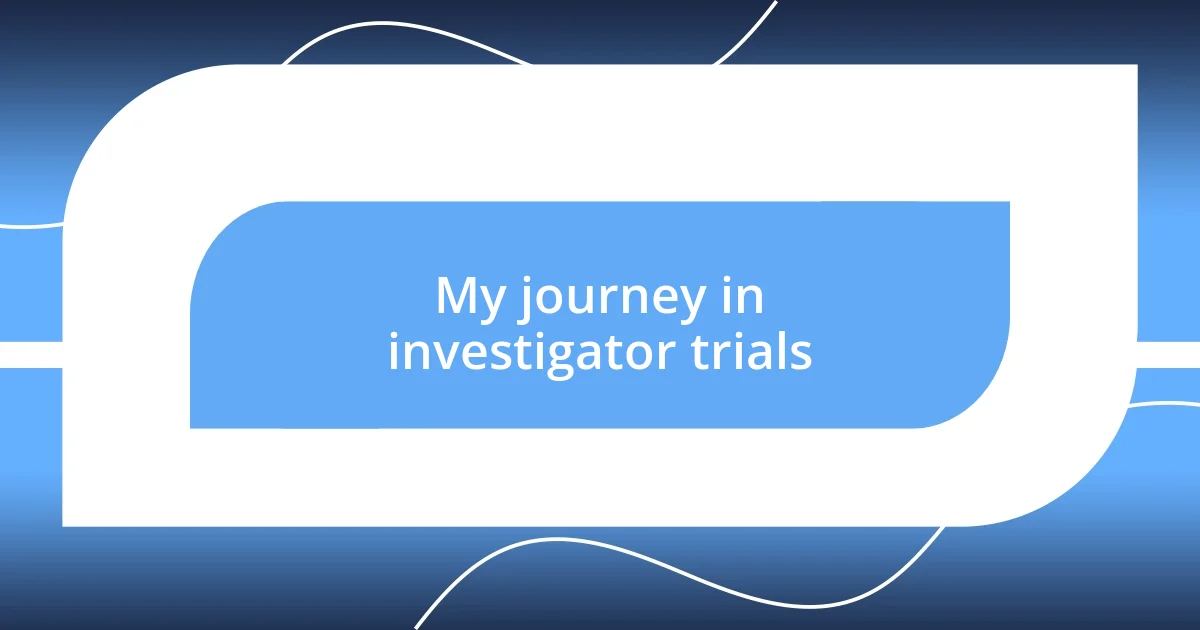
My journey in investigator trials
Embarking on my journey in investigator-initiated trials has been nothing short of transformative. I remember my first trial vividly; the blend of excitement and anxiety as I stood in the lab, preparing my first patient for what felt like an adventure in uncharted territory. Have you ever felt that jittery thrill on the brink of something groundbreaking?
As I delved deeper into the operational intricacies, I began to appreciate the profound responsibility that comes with initiating a trial. Each protocol we followed, every data point we collected, weighed heavily on my mind. It was more than just data; it was about understanding people’s lives and how they could benefit from our research. I often found myself questioning how our efforts might change their futures for the better. Did that impact motivate me? Absolutely.
Looking back, the trials were not just scientific endeavors; they were a tapestry of human experiences, challenges, and milestones shared with my team and participants. I recall one particular patient who faced hurdles during the trial but remained steadfast and hopeful. Their resilience reminded me of the importance of empathy in our work—the human connection that sparked my passion for this field. How often do we find our true motivation in the stories we encounter along the way?
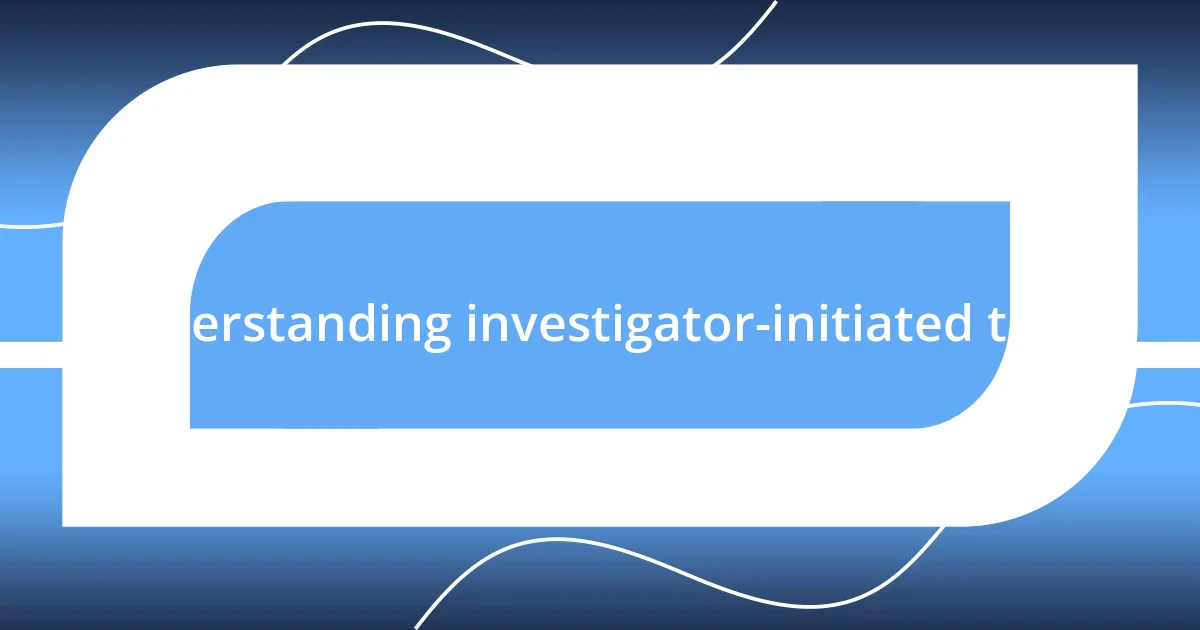
Understanding investigator-initiated trials
Understanding investigator-initiated trials is crucial for grasping their unique significance in research. From my experience, these trials are often driven by clinical questions that arise in everyday practice. I remember a specific instance where a physician on my team was frustrated by the lack of effective treatments for a particular condition. It was in those moments of shared frustration that the idea for the trial was born, illustrating how investigator-initiated studies often stem from genuine clinical needs.
The autonomy of investigators in designing and conducting their trials can lead to innovative approaches not typically seen in industry-sponsored trials. I vividly recall brainstorming sessions where we challenged conventional wisdom. Each idea, no matter how unconventional, added to the richness of our study design. It was empowering to explore unorthodox methods, knowing that they could potentially open new avenues for patient care.
However, with this freedom comes significant responsibility. Investigator-initiated trials require diligent oversight, meticulous protocol adherence, and often more complex regulatory navigation compared to industry trials. I felt this weight firsthand; managing the various components sometimes felt like juggling flaming torches. Yet, this challenge is rewarding because the trials can lead to genuine breakthroughs in treatment options. This responsibility, in my view, is what makes the success of these trials not just a personal achievement, but a milestone for the community we serve.
| Aspect | Investigator-Initiated Trials |
|---|---|
| Origin of Idea | Emerges from clinical practice and unmet patient needs |
| Control Over Design | High autonomy in protocol development |
| Regulatory Oversight | More complex due to diverse requirements |
| Emphasis | Focus on innovative solutions and personalized treatment |
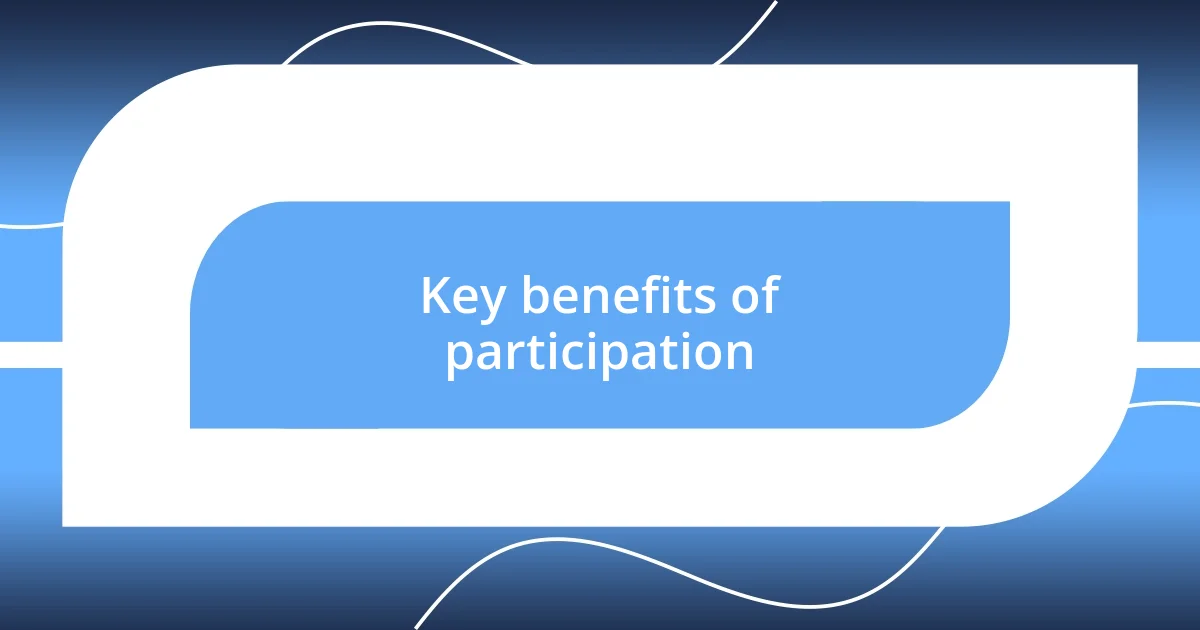
Key benefits of participation
Participating in investigator-initiated trials offers a multitude of advantages, many of which I’ve been fortunate enough to witness firsthand. One of the most significant benefits is access to cutting-edge treatments that may not yet be available to the general public. I remember a patient who joined our trial and was initially hesitant, but the possibility of receiving a novel therapy gave them a spark of hope. That connection between research and improved patient outcomes is incredibly powerful.
Here are some key benefits of participating:
- Access to Innovative Treatments: Participants can receive therapies that are still in development, giving them potential options not available elsewhere.
- Comprehensive Care and Monitoring: Trials often include rigorous follow-ups, ensuring closer monitoring of health and well-being.
- Contribution to Advancements: Each participant plays a role in pushing the boundaries of medical knowledge, helping future patients.
- Empowerment: Joining a trial can make participants feel like active contributors in their health journey, fostering a sense of control and agency.
Witnessing these benefits unfold has solidified my belief in the value of participation not just for individuals but for the larger community outside the trial. It’s like being part of a shared mission where every contribution counts toward a brighter future in healthcare.
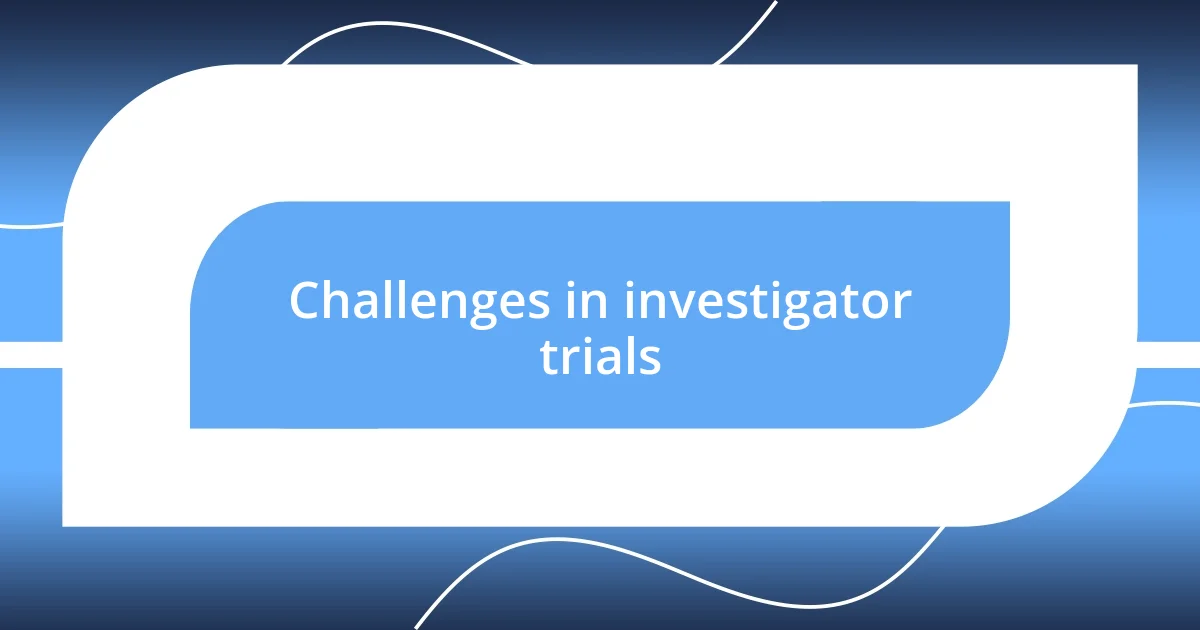
Challenges in investigator trials
Navigating the realm of investigator-initiated trials can be a daunting experience. One of the challenges I faced was the constant need for funding. Securing financial support often felt like chasing shadows. I remember an instance where we spent countless hours writing grants, only to face rejection. It reinforced the truth that, without adequate funding, even the most innovative ideas can remain dormant.
Equally, regulatory compliance is another significant hurdle. While I appreciated the necessity for oversight, the complexity of the requirements sometimes overwhelmed me. I recall meticulously reviewing a submission for an ethical review board, only to be met with a long list of questions. It made me think—how can we innovate if the rules feel like a labyrinth? This experience taught me that navigating regulation is not just a bureaucratic task; it’s an essential part of the journey that demands patience and precision.
Finally, I often grappled with participant recruitment. Engaging the right individuals for the study felt like detective work at times. I vividly remember days spent in clinics, speaking with patients who may benefit from our trial. Their stories were deeply moving, filled with hope and sometimes fear. I learned that building trust and a clear explanation of the trial’s purpose were key to overcoming their hesitations. How do you convey the potential life-changing nature of a trial in just a few sentences? It’s a delicate balance, and my experience taught me the importance of being genuinely transparent with them.
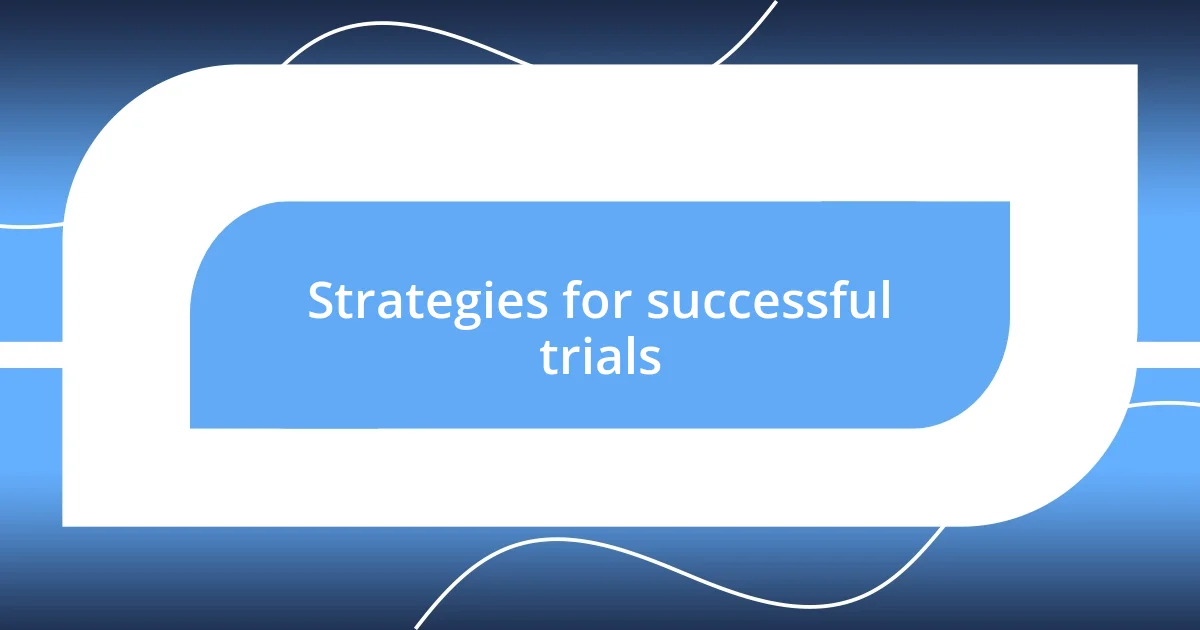
Strategies for successful trials
Developing a clear communication strategy is essential for successful investigator-initiated trials. I remember crafting a series of informational sessions to educate potential participants about the trial process. With each session, I could see their initial apprehension transform into curiosity. I often wondered—how can we make complex medical concepts more relatable? This experience taught me that simplicity in communication not only eases anxiety but fosters an environment of trust and collaboration.
Recruitment strategies are also crucial. I found that leveraging local community events to engage potential participants made a significant difference. For instance, at a health fair, I interacted with attendees, shared our trial’s purpose, and collected feedback. It was fascinating to see how personal stories and direct engagement could break down barriers. Have you ever thought about how meaningful conversations can lead to unexpected opportunities? This approach not only drove participation but also enriched the trial with diverse perspectives.
Additionally, maintaining strong relationships with stakeholders can greatly enhance trial outcomes. I remember reaching out to local healthcare providers, explaining our trial’s goals and how they could benefit their patients. These discussions felt more like building alliances than mere networking. It made me realize the power of collaborative support. When you establish shared goals and open lines of communication, you create a network that not only eases logistical challenges but also amplifies the impact of your trials. Isn’t it remarkable how connection can transform potential obstacles into cooperative solutions?
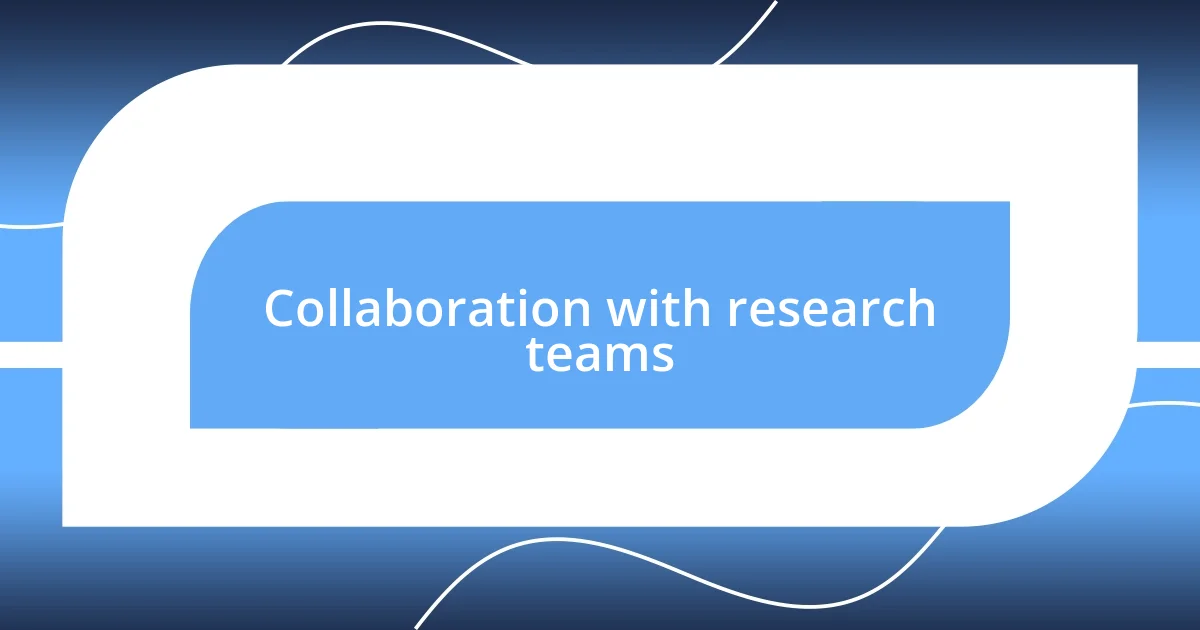
Collaboration with research teams
Collaborating with research teams has been one of the most enriching aspects of my work in investigator-initiated trials. I remember the first time we convened a multidisciplinary team, and the buzz in the room was palpable. It was fascinating to witness how different perspectives—from statisticians to ethicists—could spark innovative ideas. How often do we overlook the value of diverse expertise? Engaging with such a range of professionals helped me realize that collaboration not only enhances the quality of research but also cultivates an environment where creativity thrives.
One particular experience stands out when our team faced a critical decision regarding trial protocols. We held a brainstorming session where everyone was encouraged to voice their thoughts. I found that some of the best solutions emerged from the most unexpected suggestions. There was a moment when one team member, who had previously been quiet, proposed a new approach that transformed our method completely. Have you ever experienced a “Eureka” moment like that? It reminded me that fostering an inclusive atmosphere can lead to breakthroughs that might otherwise remain buried.
Moreover, I’ve learned that regular check-ins with the team are vital. During one challenging phase, we established weekly catch-up calls to discuss our progress and roadblocks. Not only did this improve our workflow, but it also strengthened our bonds. One day, a colleague shared their personal struggles outside of work, which fostered empathy and deeper connection among the group. How valuable is it to cultivate a space where team members feel seen and heard? This experience reinforced my belief that collaboration is more than just working together; it’s about building relationships that drive success.

Reflecting on lessons learned
Reflecting on the lessons I’ve learned throughout my journey with investigator-initiated trials truly opens my eyes to the nuances of research. For instance, I once misjudged the importance of participant feedback early in a trial. When I finally made it a priority, I was amazed at how participant insights transformed our approach. It hit me—listening isn’t just about hearing; it’s about truly understanding the experiences of those involved.
Another significant lesson was the value of adaptability. I vividly recall a moment when our trial ran into unexpected regulatory challenges, and I felt a wave of frustration wash over me. However, rather than sulking, our team pivoted and turned the situation into a learning opportunity. In retrospect, I realized that sometimes setbacks can lead to unexpected paths to success. Have you ever noticed how a moment of adversity can reveal strengths you didn’t know you had?
Lastly, I’ve come to appreciate the emotional toll that these trials can have on everyone involved. I remember a particular participant who shared her fears about not being healthy enough to complete the trial. Her vulnerability reminded me of the need to create a supportive environment. How important is it for us to nurture that emotional connection? It’s essential not only for encouraging participation but also for fostering a sense of community among all stakeholders. Each interaction adds to a richer, more meaningful experience that often goes beyond the trial’s primary objectives.












